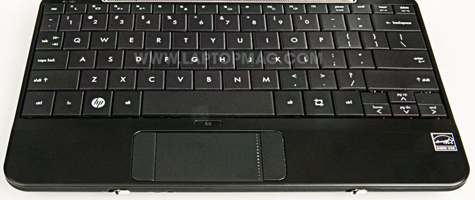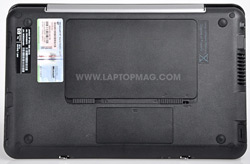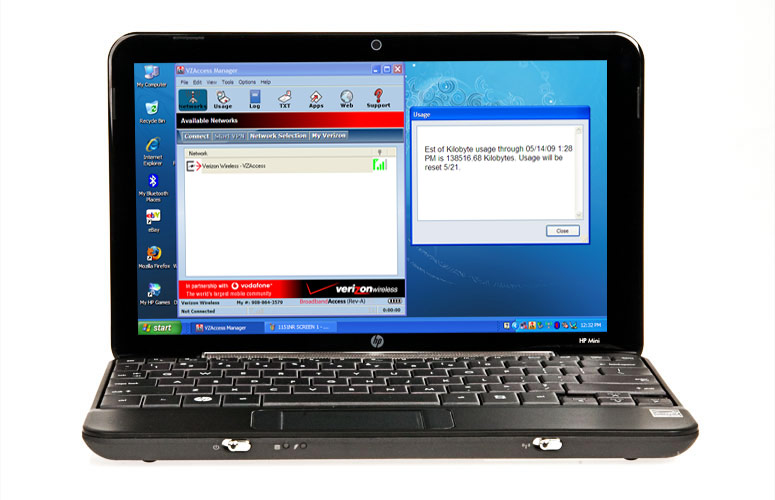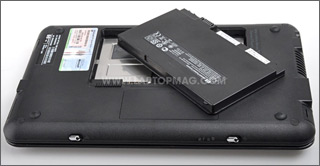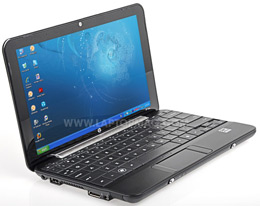Laptop Mag Verdict
This affordable and compact mobile broadband-enabled netbook offers good connectivity but short endurance.
Pros
- +
Affordably priced with contract
- +
Slim and attractive design
- +
Great keyboard
- +
Reliable mobile broadband
Cons
- -
Short battery life
- -
Expensive 6-cell battery
- -
Small, slow hard drive
- -
Runs very warm
Why you can trust Laptop Mag
Editor's Note: Portions of this review were taken from our evaluation of the original HP Mini 1000.
What good is a netbook that you can take everywhere if you can't stay connected everywhere? Enter HP's Mini 1151NR, the first netbook offered directly from Verizon Wireless with integrated mobile broadband. Assuming you're willing to pay $59.99 a month for 5GB of data, you can skip the bulky, awkward USB modem and get your Web fix on the go. You can also save some serious cash on the hardware. The Mini 1151NR sells for $199 (with a two-year contract and $50 online discount), versus $569 when similarly configured through HP.com. But while this netbook is a handy Web surfing companion, and we like the keyboard, the included 3-cell battery doesn't last long enough on a charge. Plus, the device gets very warm during use.
Design
Like its predecessors, the HP Mini 1151NR is one of the most compact netbooks on the market, measuring only an inch thin and weighing 2.4 pounds. The swirl pattern on its glossy black lid gives this machine subtle elegance, as do touches such as the silver speaker bar above the keyboard (which reminds us of a long shaver foil) and the 10-inch screen's flush display bezel. Up front you'll find two switches with their own LEDs, one for power and another for wireless.
Keyboard and Touchpad
Ergonomically, this netbook is a mixed bag. The 92-percent size keyboard remains one of the best we've tested in the 10-inch netbook class, complete with large Shift keys and just the right amount of tactile feedback. Touch typists will love this layout. On the other hand, the Mini 1151NR retains the awkward touchpad straddled by two mouse buttons. We'd prefer that these buttons reside beneath the touchpad; and if you'd rather use an external mouse, you can easily deactivate the touchpad with a dedicated button just beneath the keyboard.
Click to enlarge
Sign up to receive The Snapshot, a free special dispatch from Laptop Mag, in your inbox.
Display and Audio
The Mini 1151NR features a bright, glossy LED-backlit 10.1-inch screen with a resolution of 1024 x 576 pixels. The picture looked crisp and colorful when streaming a Saturday Night Live clip from Hulu.com. But we noticed a fair amount of distracting glare, especially during a morning bus ride from New Jersey to New York City. Those who plan on using this netbook outdoors will want to invest in a filter or film.
The speaker bar above the keyboard delivered plenty of volume but tinny sound when streaming Green Day from Pandora. An episode of 24 streaming from Hulu.com sounded loud and clear, including the crashes and explosions.
Ports and Webcam
Because the Mini 1151NR is so thin, it doesn't have as many ports as other competing netbooks. And while the system features two USB ports, Ethernet, and a 2-in-1 memory card reader, it lacks a VGA port (an expansion port on the left will fit a VGA-out adapter that is available from HP for $79), and it has only a combo mic/headphone jack, rather than one dedicated for each.
Click to enlarge
Click to enlarge
The integrated 0.3-megapixel Webcam on our review unit provided decent images in a video call over Skype; our caller could see our face clearly. The microphone, located to the left of the Webcam, picked up some background noise, but our caller could hear us just fine without our needing to speak up.
Performance and Graphics
Click to enlarge
Like most netbooks, the Mini 1151NR uses Intel's 1.6-GHz Atom N270 processor. Along with 1GB of RAM, the Mini 1000 provided the netbook performance we've come to expect. Firefox and Windows Media Player opened quickly, and we saw no performance hit when we conducted video calls over Skype, surfed the Web, and streamed music.
The IntelGMA 950integrated graphics chip with 128MB of shared memory delivered a score of 743 in 3DMark03, just a few points below the category average of 755. And in 3DMark06, the system notched a score of 90, which is 68 points below the category average.
Hard Drive and Boot Time
Compared with other netbooks, the Mini 1151NR hard drive has a relatively small 80GB hard drive and runs at a slow 4,200 rpm, a trade-off for its compact footprint; most netbooks now come with 5,400-rpm, 160GB hard drives.
The Mini 1000 booted Windows XP Home in a disappointing 64 seconds. The LAPTOP Transfer Test (copying a 4.97GB folder of mixed media) took a sluggish 9 minutes and 21 seconds at a rate of 9.1 MBps, which is 5 MBps slower than the category average.
Mobile Broadband Performance
Click to enlarge
Getting connected to the Web with the embedded EV-DO Rev. A mobile broadband was a cinch using the bundled VZ Access Manager software. And popular sites such as Yahoo, ESPN.com, CNN.com, and NYTimes.com loaded fairly quick, most within 7 to 10 seconds.
To test the downlink speed further, we downloaded Firefox 3.0 (a 7.1 MB file) from various locations, including our office, and in a moving vehicle on the New Jersey Turnpike (next to a window). Throughput ranged from 441 Kbps to 653 Kbps; that's decent but not exactly blazing. We also uploaded a 1.6MB photo to Flickr in 36 seconds, which translates to 364 Kbps.
Streaming audio from Pandora was smooth in our tests, but streaming video on Hulu was sometimes marred by annoying pauses. At other times, we could watch full screen with little stuttering.
The cost of mobile broadband starts at $39.99 for 250MB of data (with a $0.10 MB overage charge). That's not a lot of data, so we recommend the 5GB plan at $59.99 a month ($0.05 per MB overage) for most users. GlobalAccess Monthly Pans, ideal for overseas travelers, start at $129 per month, offering a 100MB allowance in more than 30 international destinations ($.005/KB after allowance). This plan uses the netbook's underlying Gobi technology from Qualcomm; Verizon Wireless supplies the necessary SIM card.
Wi-Fi and Battery Life
Click to enlarge
The HP Mini 1151NR's 802.11b/g Wi-Fi card is plenty fast, delivering a whopping 22.9 Mbps and 18.8 Mbps from 15 and 50 feet, respectively. These numbers are considerably higher than the netbook category averages of 18.9 and 15.7 Mbps. You should be able to move a good distance from your router at home or at hotspots and still expect good connectivity.
On our LAPTOP Battery Test (continuous Web surfing over Wi-Fi), the included three-cell battery lasted 2 hours and 56 minutes, which is better than the average of 2:40. When using mobile broadband, that runtime dipped to 2:24, which is fine for a trip to the coffee shop or a commute but not for a day away from the office.
Those looking for more endurance will need to spring for the six-cell battery, which unfortunately costs a hefty $129 and sticks out from the bottom of the system. We will update this review once we've had a chance to test the system with a six-cell battery.
Heat
Perhaps it's the heat generated by the mobile broadband radio, but we couldn't help but notice just how warm the Mini 1151NR got during testing. The area beneath the keyboard to the right of the touchpad was especially hot, measuring as high as 110 degrees. The bottom of the system was also hot; we measured 114 degrees near the door for accessing the memory. The keyboard was relatively cool at 92 degrees but the touchpad measured 100 degrees.
Software and Warranty
Like many other netbooks, the Mini 1151NR comes with Windows XP Home preinstalled. HP bundles a fair amount of software, including My HP Games, Snapfish Photos, Microsoft Works, Roxio BackOnTrack (backup), MigoMobile Desktop 4 (synchronization), and a trial version of Norton Internet Security.
The company backs the netbook with a one-year warranty and 24/7 toll-free technical support. You also get one year of free limited software support with product registration.
Value
Verizon Wireless isn't the first carrier to offer subsidized netbooks. AT&T has been offering a $99 9-inch Acer Aspire One (now $49.99) for months through Radio Shack (with a similar two-year agreement). AT&T is selling this Acer and a host of other netbooks in Atlanta and Philadelphia for now; these include the $149 Dell Mini 9, $349 Dell Mini 12, and $249 LG X110.
While the 10-inch HP Mini 1151NR is cheaper than the 10-inch LG netbook that AT&T offers, the LG system has a much larger hard drive (180 GB vs. 80 GB). AT&T's data plans are similar to Verizon Wireless'. You pay $60 a month for 5GB of data and $40 per month for 200MB; Verizon Wireless offers 250MB for the same price.
Verdict
Click to enlarge
While not exactly a steal, the $199 HP Mini 1151NR offers pretty good bang for your buck. The keyboard is top-notch, and we appreciate its ability to connect to the Web without having to rely on an external broadband card. On the other hand, we would like this subsidized netbook a lot more if Verizon Wireless and HP included a six-cell battery that lasted longer on a charge. We also wish the Mini 1151NR ran cooler and came with a bigger hard drive. If you can afford the monthly data fees, this netbook is worth a look.
HP Mini 1151NR (Verizon Wireless) Specs
| Bluetooth | Bluetooth 2.0 |
| Brand | Verizon |
| CPU | 1.6-GHz Intel Atom N270 |
| Card Slots | SD/MMC memory reader |
| Company Website | http://www.verizonwireless.com |
| Display Size | 10.1 |
| Graphics Card | IntelGMA 950 |
| Hard Drive Size | 80GB |
| Hard Drive Speed | 4,200rpm |
| Hard Drive Type | SATA Hard Drive |
| Mobile Broadband | EV-DO Rev. A |
| Native Resolution | 1024x576 |
| Operating System | MS Windows XP (SP3) |
| Ports (excluding USB) | VGA, Microphone, Headphone, Ethernet |
| RAM | 1GB |
| RAM Upgradable to | 1 GB |
| Size | 10.3 x 6.6 x 1.0 inches |
| USB Ports | 2 |
| Video Memory | 128MB |
| Warranty/Support | One-year limited/24/7 toll-free phone |
| Weight | 2.4 pounds |
| Wi-Fi | 802.11b/g |

